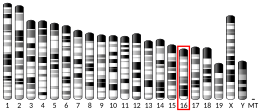胱抑素A
位於3號人類染色體的基因
胱抑素A是一种在人体中由CSTA基因编码的蛋白质。[6][7]
胱抑素超家族包括含有多个胱抑素样序列的蛋白质。一些成员是活性半胱氨酸蛋白酶抑制剂,而其他成员已经失去或可能从未获得这种抑制活性。超家族中有3个抑制家族,包括1型胱抑素(stefin)、2型胱抑素和激肽原。该基因编码一种stefin,起半胱氨酸蛋白酶抑制剂的作用,与木瓜蛋白酶和组织蛋白酶B、H和L形成紧密复合物。该蛋白是角质形成细胞中角化细胞包膜的前体蛋白之一,在表皮发育和维护。Stefin已被提议作为癌症的预后和诊断工具。[7]
相互作用
编辑参见
编辑参考文献
编辑- ^ 與血清胱抑素A相關的疾病;在維基數據上查看/編輯參考.
- ^ 2.0 2.1 2.2 GRCh38: Ensembl release 89: ENSG00000121552 - Ensembl, May 2017
- ^ 3.0 3.1 3.2 GRCm38: Ensembl release 89: ENSMUSG00000094733 - Ensembl, May 2017
- ^ Human PubMed Reference:. National Center for Biotechnology Information, U.S. National Library of Medicine.
- ^ Mouse PubMed Reference:. National Center for Biotechnology Information, U.S. National Library of Medicine.
- ^ Hsieh WT, Barrick JL, Berrettini WH, Chan MM, Fong D. A PstI DNA polymorphism in the human stefin A gene (STF 1). Nucleic Acids Res. Jun 1991, 19 (7): 1722. PMC 333958 . PMID 1674139. doi:10.1093/nar/19.7.1722-a.
- ^ 7.0 7.1 Entrez Gene: CSTA cystatin A (stefin A).
- ^ Pavlova, Alona; Björk Ingemar. Grafting of features of cystatins C or B into the N-terminal region or second binding loop of cystatin A (stefin A) substantially enhances inhibition of cysteine proteinases. Biochemistry (United States). Sep 2003, 42 (38): 11326–33. ISSN 0006-2960. PMID 14503883. doi:10.1021/bi030119v.
- ^ 9.0 9.1 Estrada, S; Nycander M; Hill N J; Craven C J; Waltho J P; Björk I. The role of Gly-4 of human cystatin A (stefin A) in the binding of target proteinases. Characterization by kinetic and equilibrium methods of the interactions of cystatin A Gly-4 mutants with papain, cathepsin B, and cathepsin L. Biochemistry (UNITED STATES). May 1998, 37 (20): 7551–60. ISSN 0006-2960. PMID 9585570. doi:10.1021/bi980026r.
- ^ Majerle, Andreja; Jerala Roman. Protein inhibitors form complexes with procathepsin L and augment cleavage of the propeptide. Arch. Biochem. Biophys. (United States). Sep 2003, 417 (1): 53–8. ISSN 0003-9861. PMID 12921779. doi:10.1016/S0003-9861(03)00319-9.
阅读
编辑- Järvinen M, Rinne A, Hopsu-Havu VK. Human cystatins in normal and diseased tissues--a review. Acta Histochem. 1988, 82 (1): 5–18. PMID 3122506. doi:10.1016/s0065-1281(87)80043-0.
- Brown WM, Dziegielewska KM. Friends and relations of the cystatin superfamily--new members and their evolution. Protein Sci. 1997, 6 (1): 5–12. PMC 2143511 . PMID 9007972. doi:10.1002/pro.5560060102.
- Kos J, Lah TT. Cysteine proteinases and their endogenous inhibitors: target proteins for prognosis, diagnosis and therapy in cancer (review). Oncol. Rep. 1998, 5 (6): 1349–61. PMID 9769367. doi:10.3892/or.5.6.1349.
- Rinne A, Järvinen M, Räsänen O. A protein reminiscent of the epidermal SH-protease inhibitor occurs in squamous epithelia of man and rat. Acta Histochem. 1979, 63 (2): 183–92. PMID 107702. doi:10.1016/s0065-1281(78)80024-5.
- Räsänen O, Järvinen M, Rinne A. Localization of the human SH-protease inhibitor in the epidermis. Immunofluorescent studies. Acta Histochem. 1979, 63 (2): 193–6. PMID 107703. doi:10.1016/s0065-1281(78)80025-7.
- Rasmussen HH, van Damme J, Puype M, et al. Microsequences of 145 proteins recorded in the two-dimensional gel protein database of normal human epidermal keratinocytes. Electrophoresis. 1993, 13 (12): 960–9. PMID 1286667. S2CID 41855774. doi:10.1002/elps.11501301199.
- Madsen P, Rasmussen HH, Leffers H, et al. Molecular cloning, occurrence, and expression of a novel partially secreted protein "psoriasin" that is highly up-regulated in psoriatic skin. J. Invest. Dermatol. 1991, 97 (4): 701–12. PMID 1940442. doi:10.1111/1523-1747.ep12484041.
- Hsieh WT, Fong D, Sloane BF, et al. Mapping of the gene for human cysteine proteinase inhibitor stefin A, STF1, to chromosome 3cen-q21. Genomics. 1991, 9 (1): 207–9. PMID 2004763. doi:10.1016/0888-7543(91)90241-6.
- Rinne A, Järvinen M, Dorn A, et al. [Low-molecular cysteine protease inhibitors in the human palatal tonsil]. Anatomischer Anzeiger. 1986, 161 (3): 215–30. PMID 2424340.
- Kartasova T, Cornelissen BJ, Belt P, van de Putte P. Effects of UV, 4-NQO and TPA on gene expression in cultured human epidermal keratinocytes. Nucleic Acids Res. 1987, 15 (15): 5945–62. PMC 306060 . PMID 2442723. doi:10.1093/nar/15.15.5945.
- Takeda A, Kaji H, Nakaya K, et al. Comparative studies on the primary structure of human cystatin as from epidermis, liver, spleen, and leukocytes. J. Biochem. 1989, 105 (6): 986–91. PMID 2768224. doi:10.1093/oxfordjournals.jbchem.a122792.
- Strauss M, Stollwerk J, Lenarcic B, et al. Chemical synthesis of a gene for human stefin A and its expression in E. coli. Biol. Chem. Hoppe-Seyler. 1989, 369 (9): 1019–30. PMID 3067731. doi:10.1515/bchm3.1988.369.2.1019.
- Davies ME, Barrett AJ. Immunolocalization of human cystatins in neutrophils and lymphocytes. Histochemistry. 1984, 80 (4): 373–7. PMID 6429090. S2CID 13559202. doi:10.1007/BF00495420.
- Machleidt W, Borchart U, Fritz H, et al. Protein inhibitors of cysteine proteinases. II. Primary structure of stefin, a cytosolic protein inhibitor of cysteine proteinases from human polymorphonuclear granulocytes. Hoppe-Seyler's Z. Physiol. Chem. 1984, 364 (11): 1481–6. PMID 6689312. doi:10.1515/bchm2.1983.364.2.1481.
- Söderström KO, Laato M, Wu P, et al. Expression of acid cysteine proteinase inhibitor (ACPI) in the normal human prostate, benign prostatic hyperplasia and adenocarcinoma. Int. J. Cancer. 1995, 62 (1): 1–4. PMID 7541394. S2CID 25265556. doi:10.1002/ijc.2910620102.
- Tate S, Ushioda T, Utsunomiya-Tate N, et al. Solution structure of a human cystatin A variant, cystatin A2-98 M65L, by NMR spectroscopy. A possible role of the interactions between the N- and C-termini to maintain the inhibitory active form of cystatin A. Biochemistry. 1995, 34 (45): 14637–48. PMID 7578072. doi:10.1021/bi00045a004.
- Martin JR, Craven CJ, Jerala R, et al. The three-dimensional solution structure of human stefin A. J. Mol. Biol. 1995, 246 (2): 331–43. PMID 7869384. doi:10.1006/jmbi.1994.0088.
- Steinert PM, Marekov LN. Direct evidence that involucrin is a major early isopeptide cross-linked component of the keratinocyte cornified cell envelope. J. Biol. Chem. 1997, 272 (3): 2021–30. PMID 8999895. doi:10.1074/jbc.272.3.2021 .





